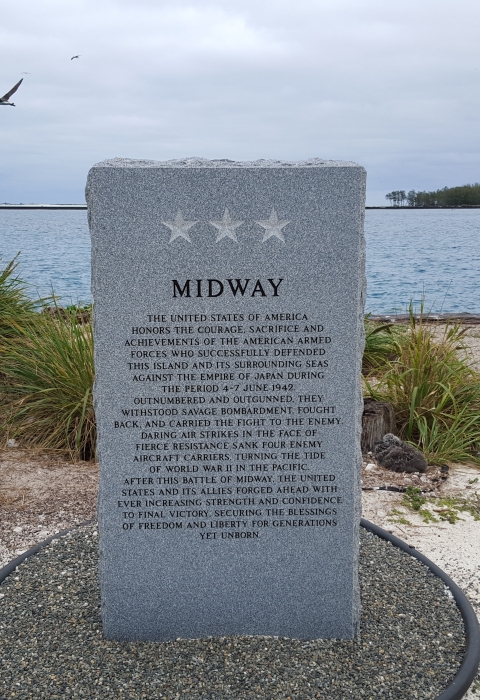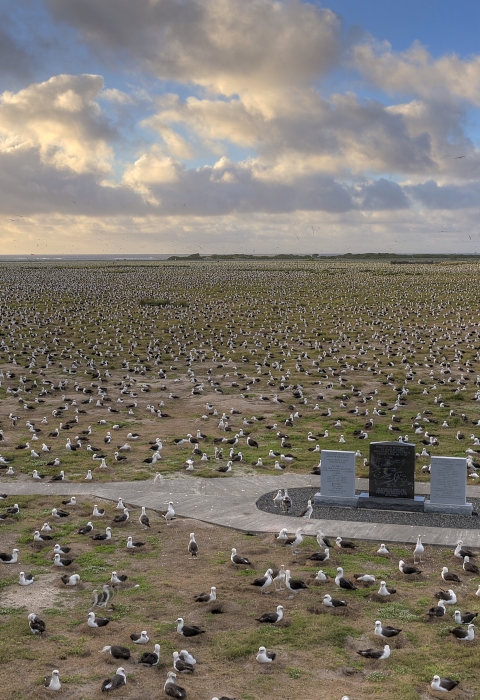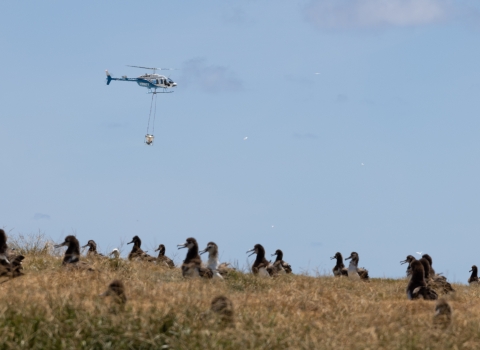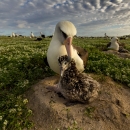Midway Atoll National Wildlife Refuge and Battle of Midway National Memorial are currently closed to public visitation. Only activities that directly support airfield operations and conservation management of the refuge, memorial and monument are allowed. However, we offer a few exciting virtual experiences that we hope you will enjoy under the Visit Us section.
Visit Us
Most national wildlife refuges offer us all a chance to unplug from the stresses of daily life and reconnect with our natural surroundings. Although Midway Atoll National Wildlife Refuge and Battle of Midway National Memorial are currently closed to public visitation, these links provide for several exciting virtual ways to visit and even tour the Refuge.
Midway Atoll 360° Virtual Tour
Location and Contact Information
About Us
Located on the far northern end of the Hawaiian archipelago, Midway Atoll National Wildlife Refuge and Battle of Midway National Memorial is located within the Papahānaumokuākea Marine National Monument. It is one the oldest atoll formations in the world that provides nesting habitat for millions of seabirds and it a touchstone for one of the most significant naval battles in our human history. Today, the U.S. Fish and Wildlife Service staff, volunteer and contractors live on Midway to support the recovery and integrity of wildlife habitat and species while balancing their own human impact on the land and seascape and protecting historical resources.
What We Do
The purpose of Midway Atoll National Wildlife Refuge and Battle of Midway National Memorial is to serve as a refuge and breeding ground for migratory birds, monk seals, sea turtles and other wildlife, while also protecting cultural resources from the Commercial Pacific Cable Company to the historic Battle of Midway.
Our Species
Midway Atoll's (Kauaihelani) three small islands provide a virtually predator-free safe haven for the world's largest albatross colony encircled by a ring of coral reef that hosts an amazing variety of unique wildlife including green sea turtles, spinner dolphins, and endangered Hawaiian monk seals among an unprecedented rate of endemic fish.
To learn about what birds, mammals, reptiles, fish, invertebrates, and plants exist at Midway Atoll, see the Species section.
Projects and Research
The principal refuge management objective on land is to enhance the quality of habitat for the full diversity of nesting seabird species. This will be accomplished by preventing the reintroduction of rats, by controlling noxious plants and by replanting specific areas with native vegetation.
Several steps have been taken or are underway to minimize human activities that adversely impact wildlife. Examples include the elimination of overhead wiring, the modification of lights that disorient night-flying birds and the timing of construction or repair activities to reduce wildlife impacts. Some particularly important beaches have been declared "off limits" to encourage undisturbed use of these areas by seals.



